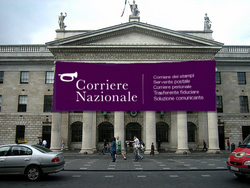Corriere Nazionale: Difference between revisions
mNo edit summary |
mNo edit summary |
||
| Line 14: | Line 14: | ||
| Fidelio Marchetto ({{wp|President (corporate title)|President}} & {{wp|Chief executive officer|CEO}}) | | Fidelio Marchetto ({{wp|President (corporate title)|President}} & {{wp|Chief executive officer|CEO}}) | ||
| Antonio Greco ({{wp|Chief financial officer|CFO}}) | | Antonio Greco ({{wp|Chief financial officer|CFO}}) | ||
| Paolo Lambriscare (group head, [[Postbank (Pacitalia|Postbank]]) | | Paolo Lambriscare (group head, [[Postbank (Pacitalia)|Postbank]]) | ||
}} | }} | ||
| industry = {{wp|Transportation industry|Transportation and logistics}} | | industry = {{wp|Transportation industry|Transportation and logistics}} | ||
Latest revision as of 19:58, 22 May 2023
 The Central Post Office (camera principale) in Nortopalazzo | |
| State-owned enterprise | |
| ISIN | PAC100010GE004 |
| Industry | Transportation and logistics |
| Founded | May 1, 1568 through the Correspondence Act |
Area served | International |
Key people | |
| Products | |
| Revenue | |
| Total equity | |
| Owner | |
Number of employees | |
| Divisions |
|
| Website | corriere |
Corriere Nazionale, legally registered as Società Repubblicana delle Corriere Nazional'e Telegrafiche (English: Republican National Telegraph and Post Company), is a public corporation in Pacitalia. It is Pacitalia's de jure flag postal service and is fully owned by the Pacitalian government.
Established in 1568 with the passage of the Correspondence Act, it is one of the oldest post carriers in the world, and provides a number of personal and business services to domestic and international customers. Corriere was the government's attempt to both nationalize and standardize mail delivery in Pacitalia, which, up to that point, had been mostly unregulated and unreliable.
The company currently delivers regular post four days a week, Tuesday through Friday, delivering approximately 533 million items each day as of 2022. It also delivers parcels, and processes and sorts mail, six days a week (Sunday being the only non-operational day). Corriere offers regular, registered and air mail services, parcel and package delivery, sorting and logistical services, corporate supply chain management solutions, direct and bulk mail services, and financial services through its wholly-owned subsidiary Postbank, which is the sixth-largest bank in the country by assets.
The company is credited with the introduction of the Pacitalian postcode system, and the Ordinamento Postale d'Esemplare Nazionale ("OPEN"), which standardizes mail and package delivery processes and rules for postal operators. Both systems have been adopted, or adapted, in Pacitalia and abroad.
Corriere enjoyed great financial success and stability well into the late twentieth century, particularly during a period of modernization in the postal services industry. It gained public confidence with its reputation for dependability, consistency, and efficiency. The deregulation of the postal services sector by the Santo Ragazzo government in 1990, followed by the closure of Postbank's predecessor, Banco Postale in 1994, were blamed as the primary factors in the company's decline at the turn of the century.
The service has struggled in modern times to remain a profitable enterprise, largely thanks to the advent of the internet, and competitive pressure from private-sector rivals. The postal service lost money every year between 1990 and 2015, with annual operating losses in some years totalling as much as Đ 400 million. Years of poor management, and neglect by the national government, eventually led to a crippling two-year strike.
The government of the day eventually forced workers back on the job and, in a controversial move, imposed a 20-year contract in concert with massive reorganization of the company. The move resulted in the restoration of postal banking services through Postbank, bringing in much-needed revenue. Since 2015, the company, though smaller, is, once again, consistently profitable.
Like all other public corporations, Corriere is under the direct authority of the Pacitalian government, which manages and operates the service through the Ministry of the Interior.
History
Early history
20th century
Modern Corriere (2000-present)
- Main article: 2010-2012 Pacitalian postal strike
The labour dispute, which remains the longest labour action in Pacitalian history, completely shut down Corriere for nearly two years. Private operators swooped into fill the vacuum left behind. Eventually resolved by an act of government, in its aftermath, Corriere's board of directors was dismissed, and its chief executive officer at the time resigned.
There were extensive long-term implications for Corriere emerging from the strike, as government forced it to restructure into a leaner organization, with reduced headcount and less frequent service. It is argued that the job action also resulted in some positive outcomes – namely the fact the postal service was saved at all, and the reintroduction of postal banking services through Postbank.
Innovations
Adoption of computer technology
OPEN system
Postcodes
Operations
Mail and package delivery
Corporate services
Postal banking
- Main article: Postbank (Pacitalia)
Private sector competitors
Corriere's main competitors in the private sector are Stampa GPN, Finestra, and Maxia, though there are numerous other private enterprises that compete for market share in parcel delivery, supply chain management and logistics.